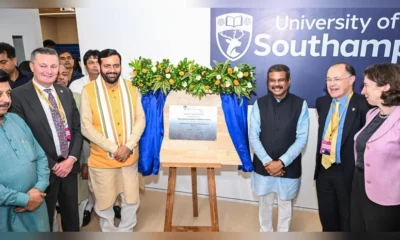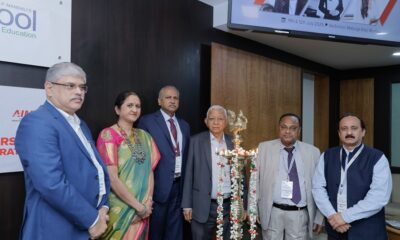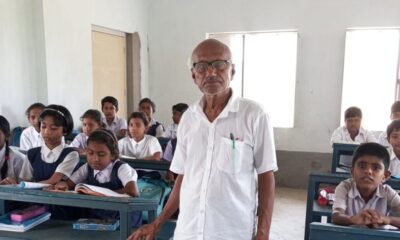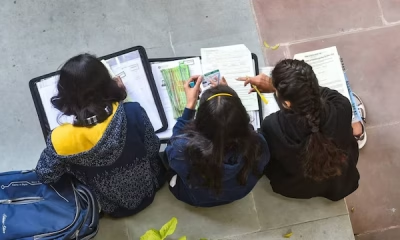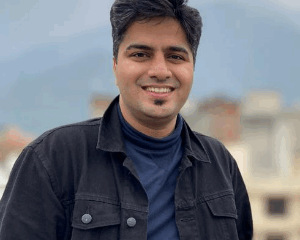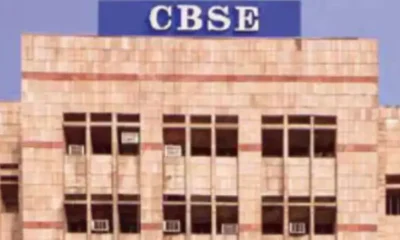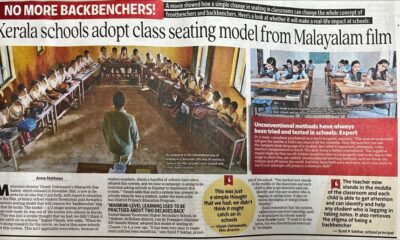News
Scindia Kanya Vidyalaya’s low-cost sanitary napkins’ manufacturing unit, spearheaded by Principal Nishi Misra, has engendered a host of positive outcomes
SKV has established a manufacturing unit to produce low-cost sanitary napkins to provide an unbroken supply to 250 women in an impoverished village of snake-charmers in Madhya Pradesh. Alongside, the project has helped break taboos, improve standards of women’s hygiene…
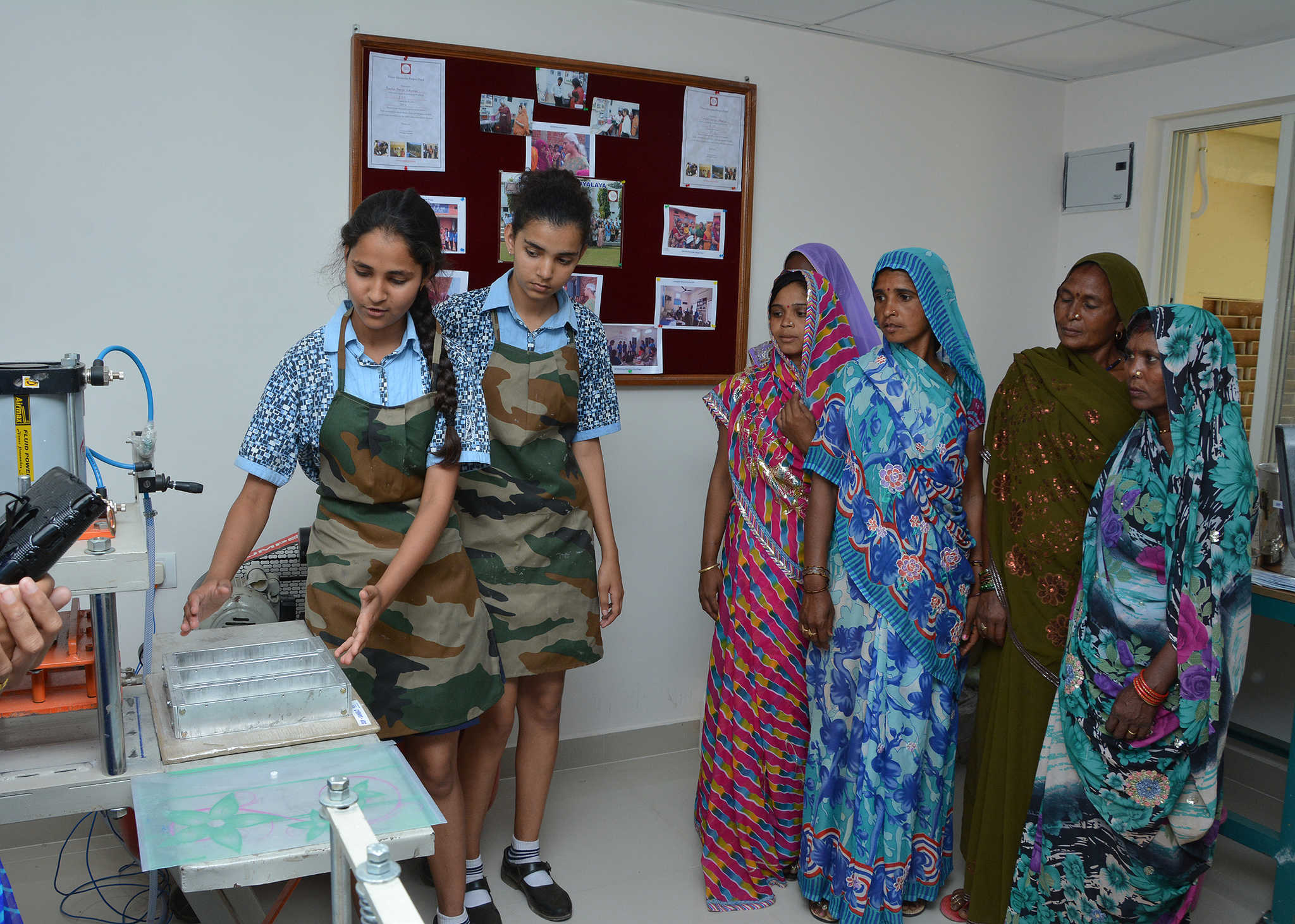
It is heartening when schools fulfil their larger purpose as institutions of learning and change. The idealism of youth, powered by the proactive guidance of dynamic educators, can lead to dramatic social transformation. SKV – Sankalp, the initiative by Scindia Kanya Vidyalaya (SKV), Gwalior, is a classic example. SKV has established a manufacturing unit to produce low-cost sanitary napkins to provide an unbroken supply to 250 women in an impoverished village of snake-charmers in Madhya Pradesh. Alongside, the project has helped break taboos, improve standards of women’s hygiene, inculcate gender-sensitization, boost indigenous machines, provide jobs in an entrepreneurial venture, and encourage community service. Here is how they went about it…
Research
The girls at SKV Gwalior, under the guidance of Principal Nishi Misra, sought opportunities to provide meaningful community service in and around their city. With her help, they conducted research and surveys for over 15 months. Their data showed that a large population of Gwalior lives in slums, with no access to basic services like water and sanitation, imposing severe hardship, especially on the female population. Hygiene and cleanliness, which is vital to women’s health, is poor and on the lowest priority. Awareness and availability of hygiene products like sanitary napkins is absent. When satisfying the basic needs of life is a constant struggle, buying expensive sanitary napkins available in the market is out of the question. As a result, the women resort to unhygienic alternatives ranging from rags, to leaves and even sand!
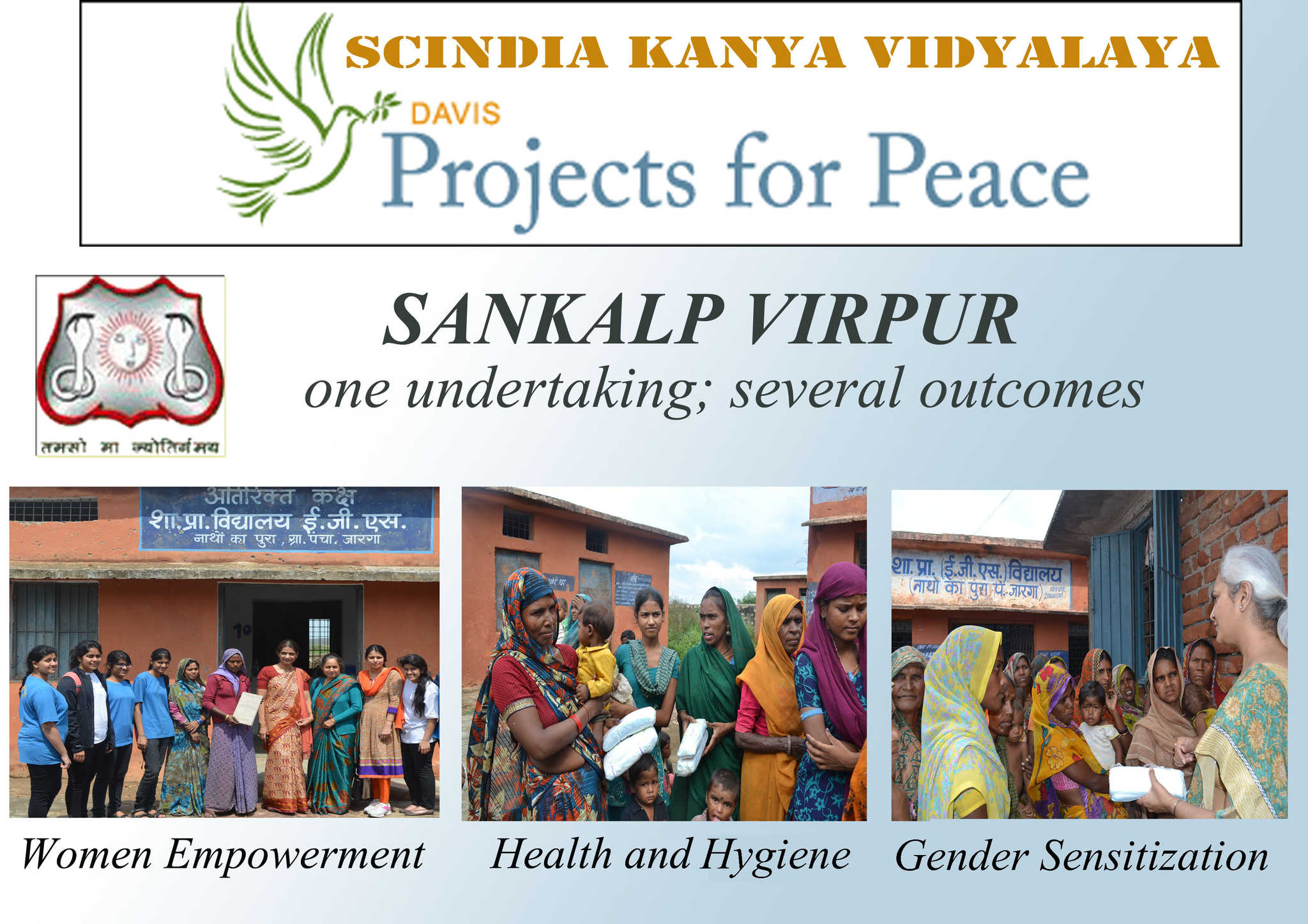
Project Identification
The Principal and the students recognized this problem and applied themselves to finding a way to supply sanitary napkins to the underprivileged women of two villages. After intense brainstorming and research, they identified a low cost sanitary napkin manufacturing unit. This fully indigenous machine was designed, created and tested by A. Muruganantham of Jayaashree Industries, Coimbatore. The machine uses bio degradable materials like banana fibre to make low cost sanitary napkins and can be run by students after minimal training. The Principal travelled to Coimbatore to inspect the machine. Convinced of its efficacy, she set the ball rolling to procure it.
Funding
Excited at the prospect of this hugely meaningful service, the team set about finding ways to finance this machine and the first consignment of raw material. Funds were raised from funfairs, house sales, contributions from alumni and from The Friends of Round Square, an international organisation, of which the school is a member. The machine arrived and was installed amidst great curiosity and enthusiasm among the students and staff. The simple training for working the machines was imparted to a pioneering group of staff and students.
Manufacturing
The simple machines are laid out on 8 stations – each the size of a student’s study desk. The process begins with tearing the raw-cotton sheets and mixing with binding cotton in a Mixer Jar. The material is weighed and 12 grams of material is portioned into moulds, which are compressed under an air-powered stamp. After inserting a water-proof strip, this initial napkin is sealed into absorbent tissue-cloth. An adhesive is applied and covered with a strip of oil-paper which can be stripped off to set the napkin in place. A maternity version with longer ‘tails’ is also being manufactured. At the end of the assembly line, the napkin is sterilised in a UV chamber. Sets of 8 napkins are packed together with cling-film and are ready for distribution.
Distribution
The team targets the distribution of the napkins to 250 women in the village of Zagra on the outskirts of Gwalior with a sustained and unbroken supply. The Principal created batches of students whom she trained to spend time with the women to educate them about the use and disposal of the napkins.
Entrepreneurship Model
Many hospitals, NGOs and Missions have approached Principal Nishi Misra, expressing interest in purchasing this product on account of its unbelievably low cost. The huge demand for the product has set her thinking of working out a small scale industry model in order to make it self-sustaining. The Principal commissioned her Commerce students to develop a Business Model Summary to set up the unit in villages as an entrepreneurial venture. The women of the village are organised into Self Help Groups around this undertaking. They gain livelihood as well as raise the standards of hygiene over a larger area.
Outreach
The first unit has been set up in Jarga. The Davies Peace Project has recognised this initiative and funded units for one more village: Veerpur. Mrs Misra has been awarded the Alexander Award by the Common-wealth Association for Science, Technology, Mathematics & Education (CASTME) for this initiative.
Gender Sensitization
Though SKV is an all-girls school, Mrs Misra encourages students of both genders to contribute ‘shram-daan’ (service by labour) and earn ‘volunteer hours’. She has invited boys and girls of many schools in the country and abroad, to sign up for the ‘shram-daan’ by building it as an activity during Youth Festivals that are held at the school. She has trained the school Biology teacher to impart a briefing and sensitisation regarding the menstrual cycle of the human female and its implications to students of both genders. They work on manufacturing the napkins and assist in their distribution at the village. This will certainly go a long way in gender sensitization of the youth.
The initiative of setting up this unit to produce and distribute sanitary napkins to underprivileged women, is named SKV-Sankalp – which in Sanskrit means, a resolution taken by SKV to help women live with dignity.
Breaking Taboos
There are several taboos attached to menstruation in our country. Nishi Misra shares, “We experienced this first hand during the planning and roll-out of this project. Curiously, it was not the young students or the young village women who had issues regarding it. It was the middle-aged women, both in the village and at school, whose reactions ranged from hushed tones to outright derogatory comments. Some of my own female staff in our school spoke to me about it in hushed, almost conspiratorial tones, saying, ‘Why are we putting up this machine where men will be able to see it?’ At the village, an elderly woman shouted at me, ‘Don’t you have any shame at distributing items like this?’
“At first, I thought that this was the case only in our country. But when I was making a presentation on the project at an international conference in Johannesburg, South Africa, several women came up to me asking for more details. When we were planning a time slot for me to address their questions, a teacher from Australia said, ‘Let’s have the session when the men are not around!’
“The taboo is obviously present across classes and countries. But the most astonishing was the fact that this was the reaction only of the women, not the men. What’s more, the students and their parents have all been very open and excited about the project.”
This article was originally published in the July 2017 issue of ScooNews magazine. Subscribe to ScooNews Magazine today to have more such stories delivered to your desk every month.
Education
University of Southampton Opens First Full-Fledged Foreign University Campus in India
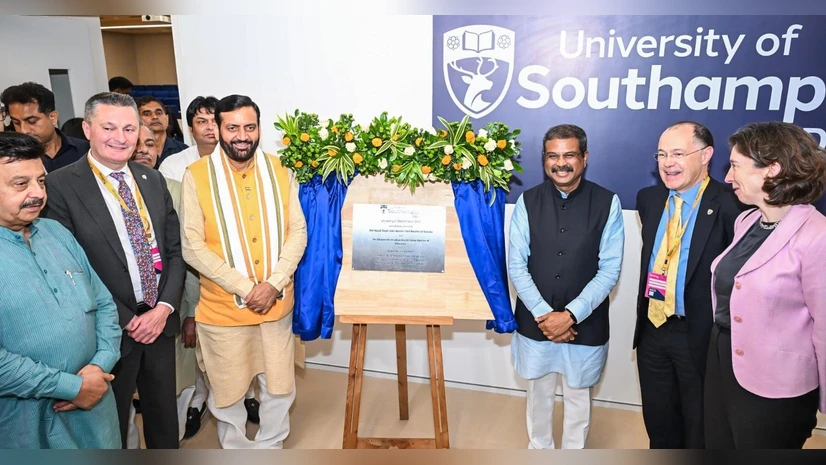
The University of Southampton has launched its fully operational campus in Gurugram, becoming the first foreign university to do so under the University Grants Commission’s (UGC) regulations.
The UK-based institution received its Letter of Intent last year and completed the campus within 12 months. Union Education Minister Dharmendra Pradhan and Haryana Chief Minister Nayab Singh Saini inaugurated the campus on Wednesday, calling it a milestone for NEP 2020 and the India-UK Roadmap 2030.
“This sets a precedent for internationalisation at home and for India’s vision of becoming a global knowledge hub,” Pradhan said.
Beginning in 2025, the campus will offer UK-aligned undergraduate and postgraduate programmes, including BSc degrees in Computer Science, Economics, Business Management, and Accounting & Finance, as well as MSc degrees in Finance and International Management. Students will also have the option to study up to one year at Southampton’s UK or Malaysia campuses.
Pradhan urged the university to introduce strong STEM offerings and focus on global challenges. Haryana CM Saini welcomed the initiative as a boost to Gurugram’s emergence as an education and innovation hub.
The university will recruit 75+ faculty members with international credentials. The inaugural student cohort includes candidates from India, the UAE, and Nepal.
Higher Education Secretary Vineet Joshi added that the UGC’s streamlined guidelines are enabling more such collaborations, helping position India as an attractive destination for international education.
The University of Southampton is a Russell Group institution and ranks among the top 100 universities worldwide. Its Gurugram campus is expected to strengthen India’s global academic ties and offer students a world-class, locally accessible education.
Education
NCERT’s New Class 8 History Textbook Addresses “Darker Periods”, Highlights Religious Intolerance and Resilience

The National Council of Educational Research and Training (NCERT) has released the new Class 8 Social Science textbook Exploring Society: India and Beyond for the 2025–26 academic session, marking the first time students are introduced to the Delhi Sultanate and the Mughal Empire at this grade level under the revised National Curriculum Framework for School Education (NCF-SE) 2023.
This new volume, aligned with the National Education Policy (NEP) 2020, takes a more direct approach in describing episodes of violence, religious conflict, and iconoclasm during the 13th to 17th centuries, while simultaneously including cautionary notes emphasizing historical context and contemporary responsibility.
A Shift in Framing Historical Conflict
In a departure from previous editions, the book explicitly refers to political instability, destruction of religious sites, and forced conversions during the Delhi Sultanate and Mughal rule. It discusses multiple invasions, plunder campaigns, and attacks on temples by rulers and generals such as Malik Kafur and Alauddin Khilji.
A newly added explanatory section, titled “A Note on Some Darker Periods in History,” outlines the rationale for such inclusions, stating the intent is to understand historical violence dispassionately and not attribute blame to present-day communities. The note reads, “Understanding the historical origin of cruel violence, abusive misrule or misplaced ambitions of power is the best way to heal the past and build a future where, hopefully, they will have no place.”
Focus on Mughal Rule: Blending Power with Faith
The chapter titled Reshaping India’s Political Map covers major developments under the Mughals, from Babur to Aurangzeb. Babur is depicted as both a cultured figure and a “brutal conqueror,” with references to his own writings about the aftermath of his military campaigns. Akbar is described as having a reign marked by “a blend of brutality and tolerance,” acknowledging both his early military actions and later efforts at interfaith dialogue.
Aurangzeb’s rule is discussed in terms of both religious motivations and political strategy. The book references farmans (imperial edicts) ordering temple demolitions and notes debates among scholars about his intentions.
While these sections document religious intolerance and violence, they are accompanied by recurring statements that urge students not to draw contemporary conclusions or apportion modern blame for historical events. One note reads: “Some of the invaders and rulers mentioned above committed terrible deeds and atrocities… but it is important to keep in mind that we, today, bear no responsibility for actions of individuals hundreds of years ago.”
Shivaji and the Marathas: Strategic Leadership and Cultural Identity
The subsequent chapter on the Marathas emphasizes Shivaji’s leadership, administrative innovation, and cultural contributions. He is portrayed as a leader who upheld his faith while respecting others and worked to restore desecrated temples.
According to the NCERT, these revisions are not simply textbook updates but part of a comprehensive overhaul that reimagines pedagogy and curriculum in light of NEP 2020. “Any comparison with the old syllabus and textbooks is therefore fruitless,” the NCERT said in a public statement.
Education
QS Rankings 2026: Delhi Named Most Affordable; Mumbai In Top 100 for Best Student Cities

The QS Best Student Cities 2026 rankings, released on July 15 by UK-based higher education consultancy Quacquarelli Symonds (QS), have placed Seoul as the world’s best city for students, overtaking London and Tokyo for the first time. However, the rankings also mark significant progress for Indian cities, particularly on the affordability and employment outcomes fronts.
India’s four largest metros—Delhi, Mumbai, Bangalore, and Chennai—all improved their positions compared to last year. Mumbai re-entered the global top 100, climbing 15 spots to rank 98th. Delhi rose to 104th, Bangalore to 108th, and Chennai reached 128th.
Among the standout achievements, Delhi has been ranked the world’s most affordable city for students, scoring 96.5 out of 100 on the affordability index. Mumbai (86.3), Bangalore (84.3), and Chennai (80.1) also featured among the top 15 globally in this category. The affordability metric assesses cost-of-living factors such as tuition, housing, and daily expenses.
The QS Best Student Cities Rankings are based on six key indicators: QS university rankings, student mix, desirability, employer activity, affordability, and student view. To qualify, cities must have a population exceeding 250,000 and host at least two universities featured in the latest QS World University Rankings.
India’s upward trajectory in the 2026 edition reflects both domestic education reforms and international recognition. Jessica Turner, CEO of QS, noted that the progress aligns with the goals of India’s National Education Policy (NEP) 2020, especially in promoting global engagement and student-centric learning. “In just ten years, India has seen a 390% increase in the number of universities featured in the QS World University Rankings,” she stated.
In the employer activity category, Delhi and Mumbai broke into the global top 50, signaling strong graduate employability. Bangalore registered the steepest climb, rising 41 positions to 59th, while Chennai jumped 29 spots, indicating the growing international credibility of graduates from these cities.
Global Highlights:
-
Seoul ranked #1 globally, followed by Tokyo (#2) and London (#3).
-
Munich and Melbourne rounded off the global top five.
-
A notable shift toward Asia is evident, with 39 cities from the Asia-Pacific region (excluding Australia and New Zealand) featured in the rankings. Among the 34 Asian cities listed in 2025, 26 improved their positions this year.
-
Other high-performing Asian cities included Kuala Lumpur (#12), Beijing (#13), and Taipei (#14), achieving their highest-ever rankings.
As India approaches the fifth anniversary of NEP 2020, the steady rise of its cities in global education indices suggests that structural investments in quality, accessibility, and employability are beginning to pay off. While challenges remain, especially in global perception and desirability metrics, the country’s metros are steadily carving a space in the international higher education map.
Education
From Classrooms to Boardrooms: Women Leaders Drive the Vision of Viksit Bharat
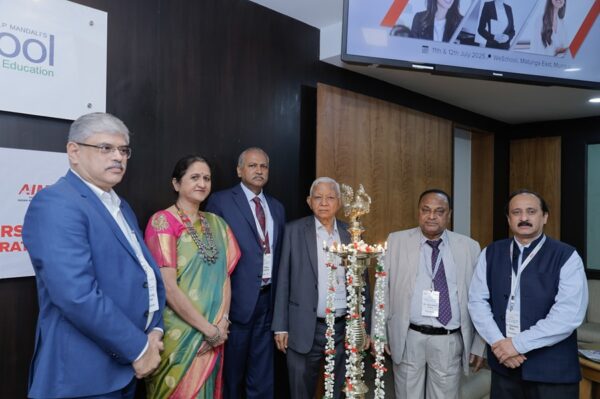
The summit on ‘Women in Leadership for Viksit Bharat’, jointly hosted by WeSchool, the Association of Indian Management Schools (AIMS), and Ratan Tata Maharashtra State Skills University, brought together a cross-section of stakeholders from governance, academia, and industry to discuss a crucial gap in India’s growth story: the underrepresentation of women in leadership roles.
At the heart of the discussion was a paradox: while women constitute 48% of India’s higher education enrollment, only a fraction make it to decision-making roles. For instance, just 9–10% of women reach boardrooms, and a mere 12% occupy leadership positions, despite 41% of the country’s higher education cohort being female. These figures, presented and reiterated throughout the summit, underscore a pressing concern — that India’s demographic dividend is incomplete without addressing its gender leadership gap.
The event positioned itself not just as a ceremonial gathering but as a call to institutional action. Leaders stressed that India’s journey toward becoming a Viksit Bharat (Developed India) by 2047 must be inclusive by design, not by default. That means policy, education, and workplace ecosystems must align to enable women from diverse socio-economic backgrounds to step into leadership roles.
The summit’s sessions explored key barriers — lack of access, socio-cultural constraints, gaps in mentorship, and the invisibilisation of women’s work in both formal and informal economies. There was also a strong focus on the role of skilling and education in building leadership capacity, particularly in sectors like STEM, administration, entrepreneurship, and governance.
Countries like Rwanda, Finland, and New Zealand were frequently referenced as case studies where inclusive leadership models have translated into stronger national outcomes — from better health and education indices to more equitable economies. India, speakers noted, has the talent pool — but it needs structural and cultural shifts to realise its full potential.
Prof. Dr. Uday Salunkhe, Group Director of WeSchool, pointed out: “While India sees 41% women in higher education, only 12% reach leadership roles — a gap we must urgently address. At WeSchool, we see education as a transformative force.”
Dr. Apoorva Palkar, Founding VC of Ratan Tata Maharashtra State Skills University, echoed that sentiment, highlighting that this isn’t just a gender issue — “It’s a missed opportunity for inclusive growth.” If women aren’t present at tables where decisions are made, she argued, “those decisions will never fully represent or benefit society at large.”
Government participation was also robust, with IAS officers including Mrs. Vinita Singhal, Mrs. Radhika Rastogi, and Mrs. Manisha Verma bringing grassroots perspectives on gender-inclusive policy design. Academic leaders like Dr. Ujwala Chakradeo and Dr. Upasna Agrawal discussed institutional reforms to embed leadership training early in educational pathways.
Industry voices such as Ms. Aarti Harbhajanka (Primus Partners), Dr. Tanaya Mishra (In-Solution Global Ltd.), and Ms. Poyni Bhatt (formerly of SINE–IIT Bombay) provided insights into how startup ecosystems and corporate governance structures can either accelerate or inhibit women’s rise to the top.
Throughout the summit, one theme remained constant: India cannot afford to exclude half its population from the leadership narrative. The path to a developed India must be paved with inclusive leadership, and that means reimagining how women access, navigate, and shape systems of power and progress.
The summit concluded with a shared resolve: to turn dialogue into design, and design into durable change. If Viksit Bharat is the destination, women’s leadership is the vehicle that can drive us there — faster, fairer, and stronger.
Education
NCERT Launches New Class 5 & 8 Textbooks, Makes Art Education Mandatory
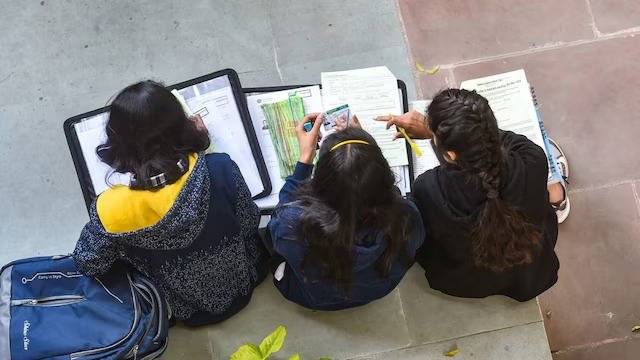
The National Council of Educational Research and Training (NCERT) has launched a new set of textbooks for Classes 5 and 8 for the 2025–26 academic session, designed in accordance with the National Education Policy (NEP) 2020 and the National Curriculum Framework for School Education (NCF-SE) 2023. This marks a significant shift in India’s school education approach, with a renewed focus on creativity, scientific temper, skill development, and values rooted in Indian heritage.
The new Class 8 textbooks include Curiosity (Science), Kaushal Bodh (Vocational Education), Poorvi (English), Malhaar (Hindi), and Kriti (Art Education). For Class 5, the newly introduced books are Santoor (English) and Veena (Hindi). Designed with simple language and rich visuals, these books aim to spark curiosity while enhancing concept clarity.
Among the highlights is Curiosity, the Class 8 science book that covers topics across physics, chemistry, and biology through real-life examples and activity-based modules. It includes dedicated chapters on COVID-19 vaccine development, India’s space missions like Chandrayaan, Ayurveda, and the Make in India initiative—positioning science education within the context of India’s modern achievements.
Kaushal Bodh introduces students to skill-based learning, preparing them for real-world employment and entrepreneurship. Poorvi, the Class 8 English book, presents stories based on the lives of national icons such as Major Somnath Sharma, Verghese Kurien, and physicist Bibha Choudhary to inspire values like courage and innovation.
In a landmark move, art education has been made compulsory. Kriti brings music, drama, and theatre into the mainstream classroom, as recommended by NEP 2020. This initiative aims to nurture creativity across disciplines, allowing children to express themselves beyond textbooks and tests.
For younger learners, the new Class 5 books Santoor and Veena adopt an activity-based learning model that promotes language acquisition through stories, songs, and play—departing from rote methods to make early education more engaging.
Despite enthusiasm from schools and parents, distribution has seen some hurdles. Reports indicate limited stock availability on platforms like Amazon and in local stores. Many parents and educators are urging NCERT to make digital versions of the books available in PDF format. NCERT has acknowledged the demand and plans to print over 15 crore copies to meet nationwide needs. Partnerships with e-commerce platforms are also being explored to streamline delivery.
This new textbook rollout is part of a broader national effort to reimagine the Indian classroom—rooted in local knowledge, focused on real-world skills, and responsive to 21st-century learning needs.
Education
US Embassy Tightens Social Media Checks for Student Visas

The U.S. Embassy in New Delhi has intensified its vetting process for applicants of F, M, and J non-immigrant visas by requiring disclosure of and public access to social media accounts used over the past five years. Under the updated rules, all social media handles—including Facebook, Instagram, Twitter, LinkedIn, TikTok, Reddit, and others—must be listed on the DS‑160 form, and profiles must be set to public during the visa screening process.
Consular officers are explicitly authorised to review candidates’ public posts, comments, and shares—and may even check private messages—to assess “hostility toward the United States” or support for extremist or anti‑U.S. content. Failure to comply, misrepresent information, or omit an account can result in visa denial and bar future visa eligibility.
This update forms part of a broader expansion of screening procedures initiated in June. Diplomatic posts worldwide paused student visa interviews to implement the new protocol, which treats every visa decision as a “national security decision”. The U.S. Embassy in India also recently issued a reminder via X, stating continuous monitoring of visa holders is in effect and violations of U.S. laws—even after visa issuance—can result in revocation and deportation.
These changes reflect the U.S. administration’s emphasis on enhanced national security and combating visa fraud. While some students and immigration advocates have raised concerns about privacy and freedom of expression, the Embassy stresses that visa screening is an ongoing process. Indian students and other applicants are advised to review their online activity and ensure transparency with their DS‑160 submissions.
Education
CBSE Requests Affiliated Schools to Host NIOS Public Exams in October–November 2025
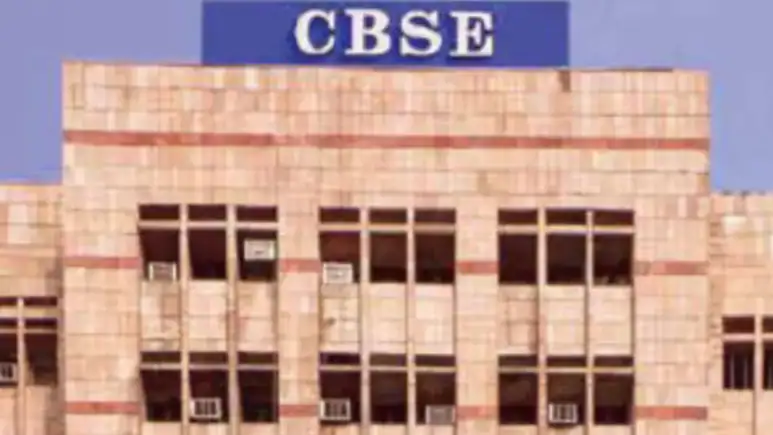
The Central Board of Secondary Education (CBSE) has called on its affiliated schools to assist with the conduct of the National Institute of Open Schooling (NIOS) public examinations scheduled for October–November 2025.
In a recent official communication addressed to principals and heads of schools, CBSE emphasised that NIOS requires infrastructural and logistical support to conduct its biannual board examinations, which include assessments for Class 10, Class 12, and various vocational courses.
“The next Public Examinations of NIOS are scheduled to be held in October–November 2025,” the notice stated, adding that CBSE-affiliated institutions have historically played a key role in enabling NIOS to run its exams smoothly.
Schools willing to extend support have been asked to register their intent on the official NIOS website at https://exams.nios.ac.in under the section: Examination Centre > Register Now.
NIOS operates under the Ministry of Education and is the country’s largest open schooling body. It caters to learners from diverse backgrounds, offering flexibility in learning and examination schedules, especially for students who may be outside the traditional school system.
“Your assistance will help NIOS in holding Public Examinations of its learners,” the CBSE notice concluded, underlining the collaborative nature of this effort.
By participating in this initiative, CBSE schools are not only supporting a national mandate for inclusive education but also contributing to educational equity by helping millions of NIOS learners access fair and organised exam environments.
Education
No More Backbenchers: How a Simple Seating Shift Is Reimagining Learning
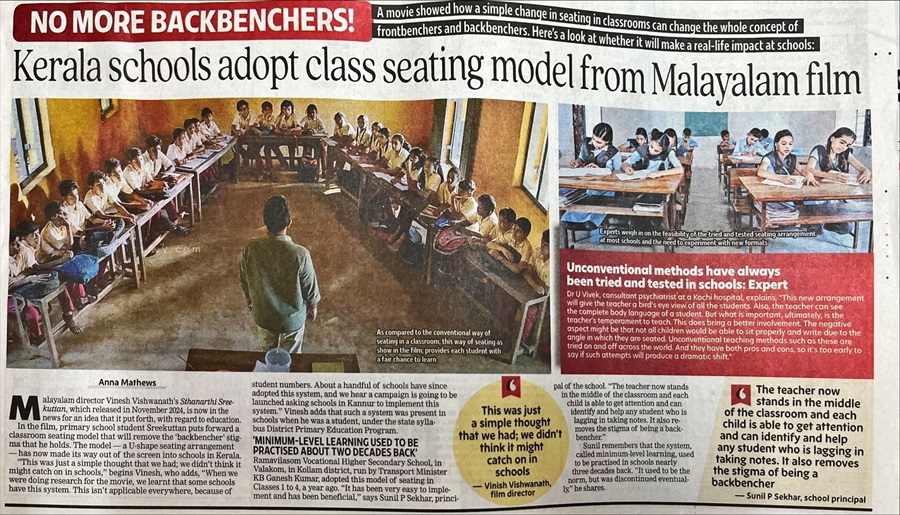
When was the last time you thought about where your students sit? If you think a seat is just a seat — think again.
A simple shift in seating arrangements, sparked by the Malayalam film Sthanarthi Sreekuttan, is inspiring schools in Kerala to break the age-old divide of “frontbenchers” and “backbenchers”. The Times of India recently reported how some schools have begun rethinking how rows of benches shape mindsets — often turning bright learners into passive listeners by default.
Preethi Vickram, Founder of Tapas Progressive Learning, applauded this unique approach online:
The truth is, classroom seating is more than furniture. It’s a mirror of our teaching philosophies. For decades, rigid rows have told students to sit down, face forward, and stay quiet while the teacher talks. One person speaks, everyone else absorbs. But learning doesn’t work in a straight line — it happens in loops, debates, disagreements, and those random questions that make everyone think.
It’s not just an emotional idea — there’s solid science behind it. A 2020 review in Frontiers in Psychology found that classroom layouts directly affect interaction and motivation. The Classroom Direct blog points out that flexible layouts foster collaboration, peer learning, and inclusivity. And a 2022 ESI Conference study noted that traditional seating can create power hierarchies where only frontbenchers thrive.
In India, we know this divide well. Backbenchers are often seen as mischievous or disinterested — but what if they were simply disengaged by design? Many schools still enforce outdated seating rules: girls must sit separately from boys; ‘weak’ students banished to the back; bright ones pushed to the front like prized trophies. But what are we telling children when we make them sit apart based on gender, marks or silence? That some voices matter more than others.
Architects and education designers have long championed a different approach. Rosan Bosch’s designs for Sweden’s Vittra School are modular and playful, showing that space itself can be a teacher. Danish Kurani, an expert in reimagining learning spaces, writes that the biggest mistake schools make is assuming they can modernise teaching methods without changing the physical space: “You can’t have collaborative, project-based learning in a classroom still set up for rows of passive listening.”
Kerala’s small but significant shift is a reminder that big change often starts with small, visible actions. When students sit in circles, clusters, or flexible pods, they are more likely to speak up, listen actively, and learn from one another. It helps break the silent stigma that ‘the back’ means you don’t matter.
Designers like Kurani argue that students should have a voice in how their classrooms look and feel — because when the space reflects curiosity and movement, it encourages the same in young minds. The Studio Schools Trust in the UK, the Reggio Emilia approach in Italy, and Big Picture Learning schools in the US all prove that flexible, student-centred learning environments are not “alternative” anymore — they’re the future.
And this shift doesn’t need fancy gadgets or big budgets. It’s the lowest-cost ‘edtech’ upgrade schools can make: moving a few benches, opening up a circle, creating nooks for quiet work and spaces for loud debate. It tells children: “Your voice matters, wherever you sit.”
In a world that needs more curiosity, connection, and creativity — we cannot afford to let seating stifle learning.
So let’s not just remove the backbenchers — let’s remove the very idea of front and back.
Because when every child feels seen and heard, there are no bad seats in the house.
References: * Classroom Direct Blog, 2021 * Frontiers in Psychology, 2020 * ESI Conference Proceedings, 2022 * Danish Kurani on Common Classroom Design Mistakes
Education
NEP 2020’s Panch Sankalpa to Guide Central Universities: Dharmendra Pradhan
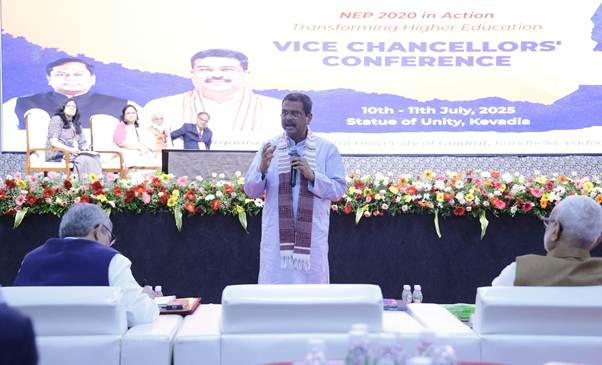
More than 50 Vice Chancellors of India’s central universities gathered in Kevadia, Gujarat for a two-day conference to assess the implementation of the National Education Policy (NEP) 2020 and lay the groundwork for the coming years. Organised by the Ministry of Education in collaboration with the Central University of Gujarat, the conference seeks to align higher education institutions with the broader national vision of Viksit Bharat by 2047.
Union Education Minister Dharmendra Pradhan, addressing the gathering, outlined the Panch Sankalpa of NEP 2020—next-generation education, multidisciplinary learning, innovation, holistic development, and Bharatiya orientation—as the guiding principles for institutional transformation. He emphasised that India’s higher education ecosystem has undergone significant change over the last decade, becoming more flexible, inclusive, and innovation-driven. Student enrolment has increased by 30% since 2014–15 to reach 4.46 crore, with female enrolment growing by 38%. The gross enrolment ratio for female students now exceeds that of males, while enrolment among Scheduled Castes and Scheduled Tribes has also improved. PhD enrolments have nearly doubled, with women registering a 136% increase.
The Minister urged Vice Chancellors to play a transformative role by redesigning curricula, improving digital infrastructure, strengthening faculty training, and promoting multidisciplinary education. He reiterated the goal of raising the gross enrolment ratio in higher education to 50% by 2035, in line with the NEP’s vision. Placing students at the centre of all reform efforts, he called on universities to foster job creators, ethical innovators, and socially responsible graduates.
Pradhan also encouraged institutions to reflect on India’s intellectual heritage while preparing for a global future, invoking the academic “Triveni Sangamam” of celebrating the past, calibrating the present, and creating the future. He recommended that each university prepare a strategy paper to fully implement NEP 2020, incorporating Indian Knowledge Systems, digital skilling initiatives, and campus-led innovations. He proposed that such review conferences be hosted at the campus level to promote decentralised engagement and exchange of ideas.
Dr. Hashmukh Adhia, Chancellor of the Central University of Gujarat, spoke about the six principles of karmayoga and the importance of Indian knowledge systems in shaping individual and collective progress. Dr. Vineet Joshi, Secretary of Higher Education, reflected on the journey since the policy’s launch and reiterated that NEP 2020 imagines universities not as degree-granting institutions, but as ecosystems of innovation, research, and holistic development. Dr. Sunil Barnwal, Additional Secretary, underlined the foundational values of access, equity, quality, affordability, and accountability, and highlighted the importance of stakeholder partnerships in driving reform.
Prof. Rama Shanker Dubey, Vice Chancellor of Central University of Gujarat, reaffirmed that all central universities are committed to advancing the vision of Viksit Bharat through concrete, on-ground measures. The conference, spread over ten thematic sessions, includes discussions on the Four-Year Undergraduate Programme, digital tools like SWAYAM and AAPAR, university governance through SAMARTH, alignment of education with the future of work, and research and innovation frameworks such as ANRF and PMRF. Other themes include equity, internationalisation, faculty development, and the integration of Indian languages and knowledge systems.
Participating universities include Jawaharlal Nehru University, University of Delhi, Tripura University, Central University of Rajasthan, Sikkim University, and many others. The outcomes of the conference are expected to help define the next phase of NEP 2020 implementation, enabling institutions to become more responsive, inclusive, and globally competitive.
Education
Less Than Half of Indian Schools Offer Skill-Based Courses for Senior Students: NCERT Survey

A recent survey conducted by NCERT’s National Assessment Centre has revealed that only 47% of schools across India currently offer any skill-based courses to students in Class 9 and above. This statistic highlights a significant gap in the availability of practical, job-ready education at the secondary level—an area that India’s New Education Policy has been aiming to strengthen.
The survey also found that student enrolment in these courses is even lower. Just 29% of students in Classes 9 and above have opted for skill-based subjects, indicating the need for better awareness, guidance, and integration of these programmes into mainstream learning.
The courses that are being offered include trending and industry-relevant subjects like Artificial Intelligence, Data Analytics, Digital Marketing, and E-commerce. However, experts believe these numbers are far from adequate in a country with one of the world’s largest youth populations.
At the higher education level, there is a stronger push for integrating skills into curricula. Many skill universities now structure their programmes with a 60% to 70% skill-based component, offering students a blend of theoretical and practical knowledge designed to make them workforce-ready.
The NCERT report recommends that more schools must be brought into the fold of skill education. With the job market rapidly evolving and the demand for digital and emerging technology skills growing, strengthening school-level skill education can bridge the gap between academic learning and real-world employability.
Building robust vocational streams in schools could also help address the challenge of students dropping out after secondary education due to a lack of clear pathways into meaningful careers.
-

 Education2 months ago
Education2 months agoCBSE’s ‘Sugar Boards’ Initiative: Tackling the Sweet Crisis in Indian Schools
-
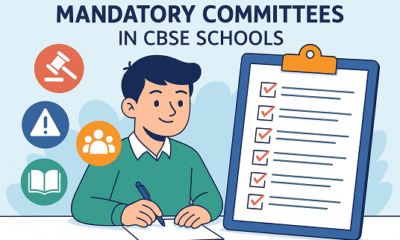
 Education3 months ago
Education3 months agoIs Your School Following These Mandatory CBSE Committees?
-
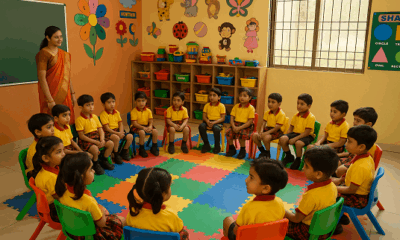
 Education3 months ago
Education3 months agoMaharashtra to Regulate Pre-Primary Education with New Law Aligned to NEP 2020
-
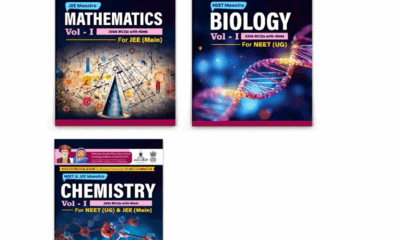
 Education3 months ago
Education3 months agoMAHAJYOTI’s Book Distribution Scheme to Empower 7,000 OBC Students Preparing for JEE/NEET & MHT-CET
-
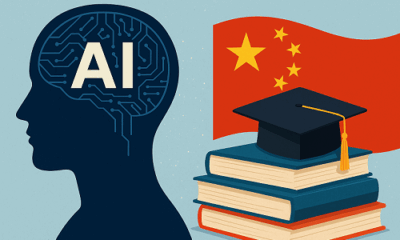
 Education3 months ago
Education3 months agoChina Embarks on Ambitious AI-Driven Education Reform to Build a ‘Strong Education Nation’ by 2035
-
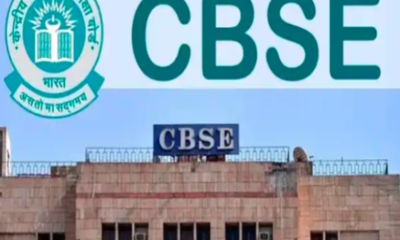
 Education3 months ago
Education3 months agoCBSE Introduces Mandatory Bridge Course for Classes 6 to 12 in Chhattisgarh Under NEP 2020
-
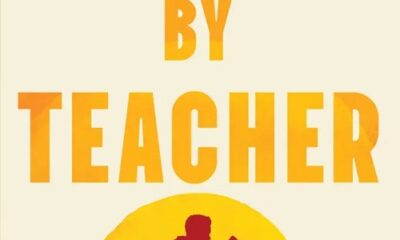
 Education2 months ago
Education2 months agoJohn King’s Book ‘Teacher By Teacher’: A Global Tribute to the Transformative Power of Education
-
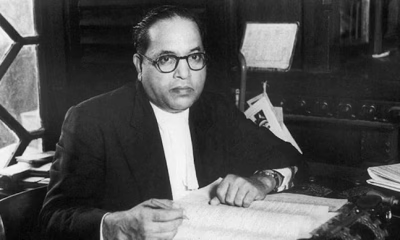
 Education3 months ago
Education3 months agoRewriting Ambedkar: Why Students Must Know the Man Beyond the Constitution
-
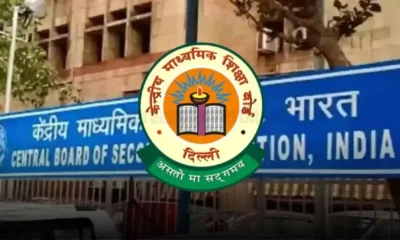
 Education3 months ago
Education3 months agoCBSE Mandates 50-Hour Annual Training for Teachers, Declares STEM as 2025 Theme
-
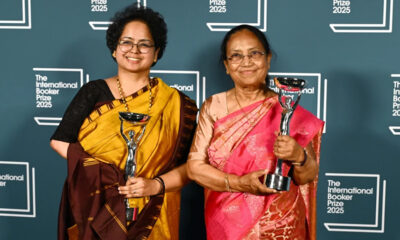
 Education2 months ago
Education2 months agoBanu Mushtaq’s International Booker Win Is a Wake-Up Call for Indian Schools to Reclaim Literature




